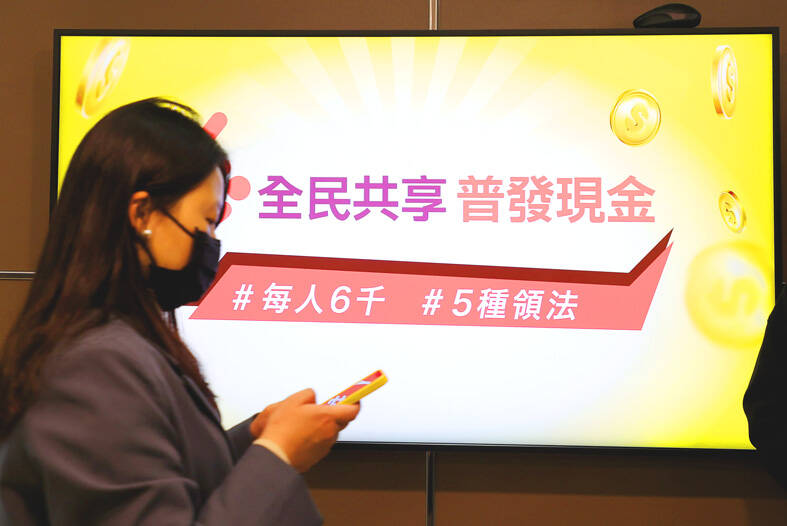The nation’s eight state-run banks and several private banks yesterday deposited NT$6,000 (US$197) into the bank accounts of people who had registered online to claim the government cash payments, well ahead of the original schedule.
The change was made following an interministerial meeting convened by the Ministry of Finance late on Friday, after O-Bank Co Ltd (王道商業銀行) earlier in the day deposited NT$6,000 in the accounts of its clients who had registered, ahead of the government’s plan to release the funds on Thursday.
O-Bank Co apologized, saying that it wanted to give its clients the payment before the long weekend, which started yesterday.

Photo: CNA
Vice Premier Cheng Wen-tsan (鄭文燦) yesterday said that O-Bank released about NT$49 million, as just more than 8,000 of its clients had registered to claim the payment.
Using some of last year’s tax surplus, the government is giving NT$6,000 to citizens, foreign nationals with permanent residency and resident spouses of Taiwanese.
People who do not wish to register online to have the money deposited into their bank accounts can get the money from select ATMs by using their bank card and entering their ID and National Health Insurance card number. They can also collect by taking their ID and National Health Insurance card to a post office from April 17.
The interministerial meeting concluded that banks could disburse the payment “as soon as possible,” an official said yesterday.
Whether people receive their deposit before the end of the long weekend would depend on the number of people who have registered their bank details and whether their bank is willing to distribute the payment earlier than planned, the official said.
As of yesterday, the nation’s eight state-run banks had begun depositing the payments, as well as several private banks, including CTBC Bank (中國信託銀行), Taishin International Bank (台新銀行), Sun Commercial Bank (玉山銀行), Union Bank of Taiwan (聯邦銀行), KGI Bank (凱基銀行) and Line Bank Taiwan Ltd (連線商業銀行).
Chunghwa Post would deposit the payments starting today.
People can update their bank passbook or access their account information online to check if they have received the payment, the Ministry of Finance and the Ministry of Digital Affairs said.
The description in bank passbooks would read “from the Executive Yuan (行政院發),” online references should read “from the Executive Yuan” or “cash payment shared by all (全民共享發現金 or 全民共享普發現金).”
If people who registered online have not received the payment, they can check their registration status at 6000.gov.tw. If they have entered incorrect information, they can register again.
If people register on the Web site after Thursday next week, they can expect to receive the deposit within two working days.
The finance ministry said some local media have incorrectly reported that the deadline for online registration was on Friday.
Online registration is available 24 hours a day until Oct. 31, it said.
Additional reporting by Hsu Tzu-ling

Seventy percent of middle and elementary schools now conduct English classes entirely in English, the Ministry of Education said, as it encourages schools nationwide to adopt this practice Minister of Education (MOE) Cheng Ying-yao (鄭英耀) is scheduled to present a report on the government’s bilingual education policy to the Legislative Yuan’s Education and Culture Committee today. The report would outline strategies aimed at expanding access to education, reducing regional disparities and improving talent cultivation. Implementation of bilingual education policies has varied across local governments, occasionally drawing public criticism. For example, some schools have required teachers of non-English subjects to pass English proficiency

‘FORM OF PROTEST’: The German Institute Taipei said it was ‘shocked’ to see Nazi symbolism used in connection with political aims as it condemned the incident Sung Chien-liang (宋建樑), who led efforts to recall Democratic Progressive Party (DPP) Legislator Lee Kun-cheng (李坤城), was released on bail of NT$80,000 yesterday amid an outcry over a Nazi armband he wore to questioning the night before. Sung arrived at the New Taipei City District Prosecutors’ Office for questioning in a recall petition forgery case on Tuesday night wearing a red armband bearing a swastika, carrying a copy of Adolf Hitler’s Mein Kampf and giving a Nazi salute. Sung left the building at 1:15am without the armband and apparently covering the book with a coat. This is a serious international scandal and Chinese

TRADE: The premier pledged safeguards on ‘Made in Taiwan’ labeling, anti-dumping measures and stricter export controls to strengthen its position in trade talks Products labeled “made in Taiwan” must be genuinely made in Taiwan, Premier Cho Jung-tai (卓榮泰) said yesterday, vowing to enforce strict safeguards against “origin laundering” and initiate anti-dumping investigations to prevent China dumping its products in Taiwan. Cho made the remarks in a discussion session with representatives from industries in Kaohsiung. In response to the US government’s recent announcement of “reciprocal” tariffs on its trading partners, President William Lai (賴清德) and Cho last week began a series of consultations with industry leaders nationwide to gather feedback and address concerns. Taiwanese and US officials held a videoconference on Friday evening to discuss the

PERSONAL DATA: The implicated KMT members allegedly compiled their petitions by copying names from party lists without the consent of the people concerned Judicial authorities searched six locations yesterday and questioned six people, including one elderly Chinese Nationalist Party (KMT) member and five KMT Youth League associates, about alleged signature forgery and fraud relating to their recall efforts against two Democratic Progressive Party (DPP) legislators. After launching a probe into alleged signature forgery and related fraud in the KMT’s recall effort, prosecutors received a number of complaints, including about one petition that had 1,748 signatures of voters whose family members said they had already passed away, and also voters who said they did not approve the use of their name, Taipei Deputy Chief Prosecutor